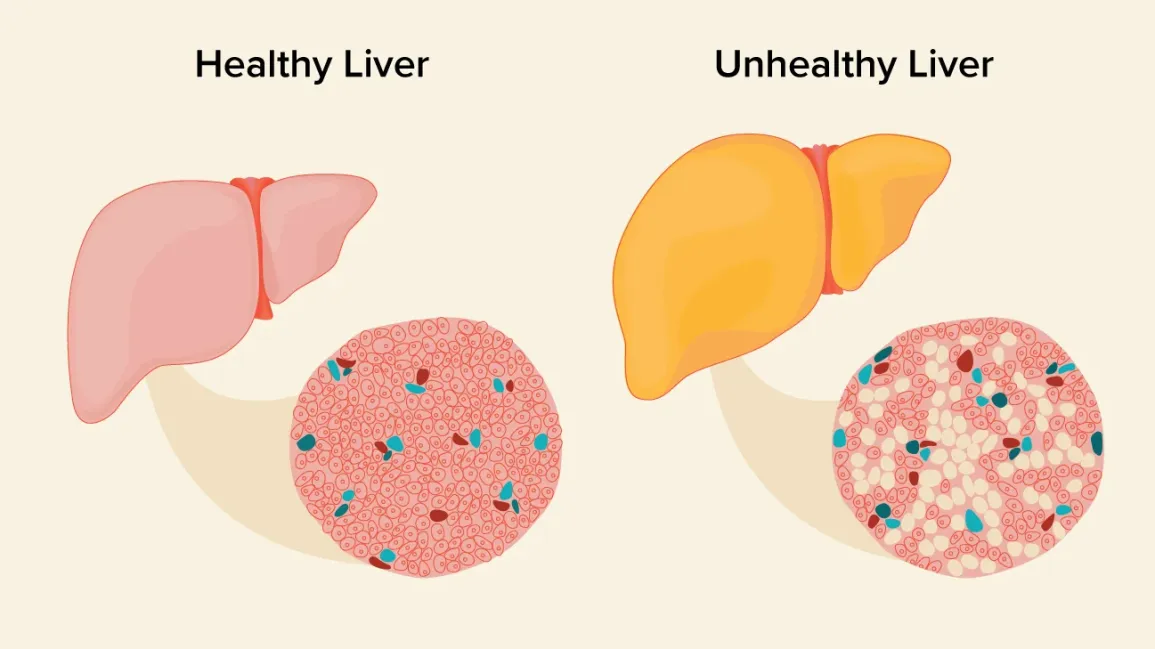
Fatty liver, also known as hepatic steatosis, occurs when excess fat accumulates in the liver. This condition can be divided into two main types: Non-Alcoholic Fatty Liver Disease (NAFLD) and Alcoholic Liver Disease (ALD), depending on the cause. NAFLD is more common in individuals who are obese or overweight, while ALD is directly related to excessive alcohol consumption.
Non-Alcoholic Fatty Liver Disease (NAFLD)
NAFLD is the most common form of chronic liver disease in the developed world, largely due to the rising prevalence of obesity, type 2 diabetes, and metabolic syndrome. NAFLD encompasses a spectrum of liver conditions not related to alcohol use, ranging from simple fatty liver (steatosis) to Non-Alcoholic Steatohepatitis (NASH), which involves inflammation and liver cell damage, potentially leading to fibrosis or cirrhosis.
Risk Factors
- Obesity, particularly central obesity
- Type 2 diabetes
- Metabolic syndrome (includes hypertension, hyperlipidemia, and insulin resistance)
- High intake of fructose
- Certain genetic predispositions
Symptoms
NAFLD often presents with no symptoms, but some individuals may experience fatigue or discomfort in the upper right abdomen. It’s usually detected during routine blood tests or imaging studies done for other reasons.
Alcoholic Liver Disease (ALD)
ALD results from excessive alcohol consumption and includes a spectrum of liver diseases such as alcoholic fatty liver, alcoholic hepatitis, and cirrhosis. The risk of developing ALD depends on the amount and duration of alcohol use, though individual susceptibility varies greatly.
Symptoms
Early stages of ALD might not cause symptoms, but as the condition progresses, symptoms can include weakness, weight loss, and jaundice. Severe ALD can lead to serious complications like liver failure and require urgent medical attention.
Diagnosis
Both NAFLD and ALD are diagnosed based on medical history, physical examination, blood tests, and imaging studies like ultrasound, which can detect fat in the liver. Additional tests, such as liver biopsy, might be needed to assess the severity of liver damage, especially for NAFLD to distinguish between simple fatty liver and NASH.
Treatment
- Lifestyle Changes: The cornerstone of treatment for NAFLD and the early stages of ALD involves weight loss through diet and exercise. Even a modest weight loss of 5-10% can significantly reduce liver fat.
- Limiting Alcohol: For ALD, abstaining from alcohol is crucial. For NAFLD, alcohol should be consumed in moderation, if at all.
- Medications: There are no specific medications approved for NAFLD, but treating underlying conditions such as diabetes and hyperlipidemia is important. In the case of ALD, certain medications might be used to manage alcohol dependency and related complications.
- Monitoring for Progression: Regular follow-up to monitor liver function and progression of liver disease is important for managing both NAFLD and ALD.
Prevention
Preventing fatty liver involves maintaining a healthy weight, eating a balanced diet, exercising regularly, managing chronic conditions like diabetes, and moderating alcohol consumption. Regular health check-ups can help detect changes in liver health early, allowing for timely intervention.
Understanding the impact of lifestyle choices on liver health is crucial. If you suspect you have risk factors for fatty liver, consult a healthcare provider for evaluation and personalized advice on managing your liver health.
To book online select the date and time that suits you best – alternatively, please contact us with any questions via the chat, call or email links provided.
Telephone: 020 7101 3377
Why Choose London Private Ultrasound?
At London Private Ultrasound, we prioritize your health and comfort. Our team of experienced radiologists and healthcare professionals are dedicated to providing the highest quality of care. Here’s why you should choose us:
- Expert Radiologists: Our team consists of highly trained and experienced radiologists who are experts in ultrasound diagnostics.
- State-of-the-Art Technology: We use the latest ultrasound machines to ensure the highest level of accuracy in our scans.
- Patient-Centered Care: We focus on creating a comfortable and stress-free environment for our patients.
- Timely Results: We understand the importance of quick diagnosis and provide fast and reliable results.
- Convenient Location: Located in the heart of London, our clinic is easily accessible.
Book Your Ultrasound Scan Today
At London Private Ultrasound, we are committed to providing high-quality diagnostic services with a patient-centered approach. Our expert radiologists and cutting-edge technology ensure that you receive the best possible care.
Don’t wait to get the answers you need. Book your abdomen or pelvic ultrasound scan today by contacting us at:
Address: 27 Welbeck Street, London, W1G 8EN
Tel: 020 7101 3377
You can also schedule an appointment online through our website. Experience the convenience, comfort, and expertise at London Private Ultrasound.
We look forward to assisting you with your healthcare needs and ensuring you receive the best possible diagnostic care.
ExcellentBased on 540 reviews Trustindex verifies that the original source of the review is Google.
Trustindex verifies that the original source of the review is Google. Jackie Supernova2024-07-16excellent service. easy to book and adjust dates if required. The staff are friendly. The clinician was attentive and informative and did a thorough investigation. Highly recommend if you need fast reliable diagnostic results.Trustindex verifies that the original source of the review is Google.
Jackie Supernova2024-07-16excellent service. easy to book and adjust dates if required. The staff are friendly. The clinician was attentive and informative and did a thorough investigation. Highly recommend if you need fast reliable diagnostic results.Trustindex verifies that the original source of the review is Google. Mostafa Hawwash2024-07-16Quick and fast and reliable. Thank youTrustindex verifies that the original source of the review is Google.
Mostafa Hawwash2024-07-16Quick and fast and reliable. Thank youTrustindex verifies that the original source of the review is Google. Aisha Fontaine2024-07-16Reza Farahmandfar, was very professional, my appointment was on time. He explained every step of the way. Definitely will book with him again.Trustindex verifies that the original source of the review is Google.
Aisha Fontaine2024-07-16Reza Farahmandfar, was very professional, my appointment was on time. He explained every step of the way. Definitely will book with him again.Trustindex verifies that the original source of the review is Google. Sammy Andrews2024-07-15Brilliant clinic. I've visited a few the last few years for various issues and London Private Ultrasound was prompt, clean, professional and reassuring. If I need anything else I will definitely go back.Trustindex verifies that the original source of the review is Google.
Sammy Andrews2024-07-15Brilliant clinic. I've visited a few the last few years for various issues and London Private Ultrasound was prompt, clean, professional and reassuring. If I need anything else I will definitely go back.Trustindex verifies that the original source of the review is Google. Matt Mawson2024-07-14Friendly, reassuring, calm manner with a easy to understand explanation of the details. Highly recommended.Trustindex verifies that the original source of the review is Google.
Matt Mawson2024-07-14Friendly, reassuring, calm manner with a easy to understand explanation of the details. Highly recommended.Trustindex verifies that the original source of the review is Google. uday singh2024-07-10I was there for my lower limb ultrasound but the quality of explanation by the doctor was so comprehensive that I decided to get a full body scan. Greatly impressed with the attention and attitude of everyone there. If anyone requires an ultrasound, in my view this is the place.Trustindex verifies that the original source of the review is Google.
uday singh2024-07-10I was there for my lower limb ultrasound but the quality of explanation by the doctor was so comprehensive that I decided to get a full body scan. Greatly impressed with the attention and attitude of everyone there. If anyone requires an ultrasound, in my view this is the place.Trustindex verifies that the original source of the review is Google. Aisha Smith2024-07-09Great experience, got an appointment within an hour. Sonographer was lovely and really reassuring and was useful to be able to see the images on the large screen while lying down.Trustindex verifies that the original source of the review is Google.
Aisha Smith2024-07-09Great experience, got an appointment within an hour. Sonographer was lovely and really reassuring and was useful to be able to see the images on the large screen while lying down.Trustindex verifies that the original source of the review is Google. Joana Macedo2024-07-08Same day scan. Very knowledgeable clinician. Thanks
Joana Macedo2024-07-08Same day scan. Very knowledgeable clinician. Thanks
London Private Ultrasound Clinic
At London Private Ultrasound all our services, our specialists and us using the latest Ultrasound technology is designed to deliver the greatest possible experience for all our patients and visitors.
We are conveniently located in Welbeck Street, a stone’s throw from the famous Harley Street and our clinic is a place where you will be welcomed by our friendly staff and feel comfortable in our safe, clean, and reassuring environment.
Address: 27 Welbeck Street, London, W1G 8EN
Tel: 020 7101 3377


